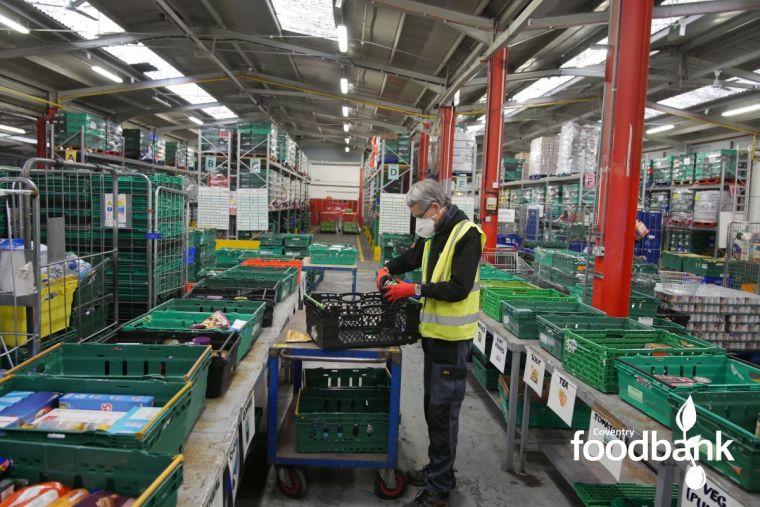With foodbanks facing the perfect storm, the right to food needs to become a reality

With petrol shortages headlining the UK news, this has undoubtedly been an unusual week. The last time I encountered fuel shortages was in Harare, Zimbabwe on 25 October, 2019. We had arranged a one-day whistle-stop visit to an orphanage supported by Feed the Hungry. As we left the airport, the first petrol station we saw had a snake of cars trailing out of the forecourt, around the corner and into the far distance. I asked John, who was driving our car, how long it took to get to a petrol pump. "It can take many hours," he said, "perhaps days - in fact some drivers will pay people to queue for them!"
Fights over fuel pumps, harassed petrol station workers and queues of cars clogging the roads are not scenes we expect to see in the UK. But this isn't the first time in recent months we have been confronted by the fact the UK is not immune from the hardships of poverty and scarcity of resources. Almost 8.4 million people in the UK struggle to afford to eat. This is equivalent to the entire population of London! As Christians it is a figure that elicits both concern and compassion. We see the brokenness of the world and long for something better.
At the start of September, Coventry City Council voted to become a "Right to Food" City - a strategically important step towards establishing a safety net for people struggling with this most basic of needs.The best way to think of a "Right to Food" is the same way we think of our right to healthcare or education. It's the obligation of public authorities to remove the barriers to people accessing healthy food.
But the reality is that there's a big, long-term piece of work needed to translate a "Right to Food" into tangible actions that will positively impact the lives of our most vulnerable citizens. Just as there can sometimes be a gap between our longing to see an end to suffering and taking the practical steps to meet the need.
As the Regional Operations Director of Feed The Hungry, who run Coventry Foodbank, I have experienced periodic upswings in demand for emergency food. This can be caused by anything from political decisions, to economic hardship or even a global pandemic.
But as we approach the end of the year, a number of factors appear to be coalescing which, without wishing to be a harbinger of doom and gloom, give me cause for concern. All these issues have been reported in the news, but its only when considered collectively that the magnitude of the coming storm becomes apparent.
The £20 a week top up on universal credit came to an end at the end of September. Inflation rose to 3.2% in August, even before the recent hikes in fuel prices have been considered. Furlough has just come to an end and there is no easy way to predict how many jobs will be lost as a result.
Clients tell us they were struggling to make ends meet even with the £20 top up of Universal Credit, so they have no idea how they will cope once it is withdrawn. Add in the inflation, unemployment and shortages - the picture really does look bleak.
Walking through the warehouse this morning the empty spaces in racking are a stark reminder that the demand for emergency food is beginning to deplete stocks. Alongside this, Ann, who runs one of our busiest foodbanks, described the current demand for food parcels as "close to pandemic levels". That rise appears to be a repeated story across many of our foodbank distribution centres.
So the question remains: How do we make the "Right to Food" a reality and not just a hollow slogan? How does our God-given desire to see people cared for move from just an expectation for the new creation?
The first step is to take a step. Don't just say 'this shouldn't be a problem'. Respond to the needs around you. When there is a shortage in supply, be it of food or fuel, the call to put others' needs above our own can often go out the window as we descend into a survival of the fittest mentality. But it is at times like these that we have the opportunity to be the greatest witness. The opportunity to model Christ's love and sacrifice by actively looking to see the needs of others met.
Like many other foodbanks, Coventry foodbank relies on the generous food donations from thousands of people and organisations. And we continue to rely on the many many volunteers and donors to help us meet the increased demand to whom we are incredibly grateful. But if we are going to meet the needs in this uniquely challenging time, all of us who are able need to step up and play our part.
Gavin Kibble MBE, is Regional Operations Director at humanitarian charity Feed The Hungry. After founding Coventry Foodbank in 2011, which is now one of the largest foodbanks in the country, Gavin has spent the last ten years aiding charitable work in the city of Coventry, pioneering a winter night shelter, and befriending service that provided friendship to over 500 isolated older people. Gavin was recently awarded an MBE for his work during the pandemic, spearheading summer holiday food programmes for over 2,000 of Coventry's most vulnerable children. Gavin is on the Leadership team at Mosaic Church with his wife Vivienne.











